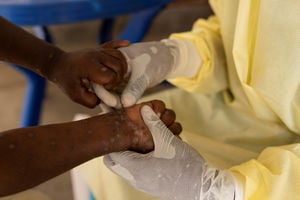Africa CDC caution on false Mpox tests

Mpox testing can sometimes yield a negative result in the laboratory even when the disease is present.
What you need to know:
- Until 2022, neither of the two strains of Mpox was frequently reported outside of a handful of African countries.
- Mpox testing can sometimes yield a negative result in the laboratory even when the disease is present.
African governments have been advised not to rely solely on laboratory tests while diagnosing Mpox.
This warning by the Director General at the Africa Centre for Disease Control and Prevention (Africa CDC), Dr Jean Kaseya, comes after Kenya confirmed its second case of Mpox.
The truck driver had travelled from Uganda to the Malaba border. The confirmation was based on laboratory tests. However, Kenya did not specify which rapid tests were used or for which strain.
In an official statement last week, Health Cabinet Secretary Deborah Barasa said that 42 samples have been submitted to laboratories for Mpox testing, of which 40 samples have tested negative.
"We have also screened 426,438 travellers at our various Ports of Entry across the country," she added.
Earlier this month, during a stakeholders' meeting held by the Ministry of Health (MOH), Dr Patrick Amoth, the Director General of Health at MOH, emphasised the urgency of taking decisive action and forming strong partnerships.
He said Kenya has been enhancing its preparedness and response to the disease.
Drawing lessons from the Covid-19 pandemic, Dr Amoth outlined key measures, including rapid laboratory testing, community engagement, infection prevention control, and comprehensive case management.
However, in an official letter dated August 23, 2024 and Referenced as AU/CDC/ODG/LT/2996.24, Dr Kaseya highlighted that they are now concerned about false negative test results.
"Some of you are reaching out to us, especially in the context where lab result is negative for Mpox. To better advise you, Africa CDC have also consulted our African best epidemiologist and lab experts but also international experts and appropriate bodies like US CDC, China CDC, Europe CDC and the World Health Organisation (WHO)," he started off.
"The conclusion is that relying solely on laboratory test results for diagnosing Mpox is not advisable. While important, lab tests should be interpreted in conjunction with clinical and epidemiological data. False negatives are possible, and a negative test does not entirely rule out Mpox, especially if there is strong clinical suspicion, and for all Mpox cases, countries have to perform HIV and STI tests," Dr Kaseya said.
There are two main strains, or clades, of Mpox. Until 2022, neither was frequently reported outside of a handful of African countries.
But that changed when the Clade IIb, a virus causing a "milder" version of mpox, spread from Nigeria to the global north, birthing international concern and a large-scale effort to produce vaccines and immunise newly at-risk populations.
Although interventions eventually controlled the international Clade IIb outbreak, Mpox continued circulating, including Clade I, the more virulent strain endemic in the Democratic Republic of the Congo.
As a result, the WHO declared an emergency involving the more lethal Clade I for two reasons: the increased dissemination of Clade I cases in Africa, even in areas and countries where it had never been detected before, and the appearance of a novel subtype of the clade called Ib.
Clade Ib possesses genotypic and epidemiologic characteristics favouring human-to-human transmission.
According to Dr Kaseya, this is why the continent needs a holistic approach that integrates laboratory testing with clinical assessment and epidemiological data, which is essential for accurately diagnosing and managing Mpox.
He told African Health Ministers that the diagnosis and management of Mpox should involve a comprehensive approach that considers multiple factors such as clinical presentation, epidemiological context, history and risk factors, follow-up and monitoring, as well as differential diagnosis whereby other conditions with similar symptoms (like chickenpox,
measles, or bacterial skin infections) should be considered and ruled out.
The Africa CDC Director General also explained that, due to several factors, Mpox testing can sometimes yield a negative result in the laboratory even when the disease is present.
First, the timing of sample collection and the accuracy of Mpox testing depend significantly on when the sample is collected. If the sample is taken too early in the infection, the viral load might be too low to be detected.
Secondly, the type of sample collected e.g., from a lesion, blood, or other bodily fluids) can affect the test results.
Lesion swabs are typically the most reliable, but if a different type of sample is used, it may not contain enough viral material for detection.
Dr Kaseya also noted that poor sample collection techniques can lead to inadequate samples, resulting in a false negative. This might include improper handling, storage, or contamination of the sample.
"Test sensitivity and specificity: no test is perfect, and some Mpox tests may have lower sensitivity, meaning they might not detect very low levels of the virus. This can result in a false negative if the viral load in the sample is below the test's detection threshold, "he told African Ministers.
Regarding viral variability, the Director General explained that certain tests might not detect different strains or mutations of the Mpox virus as easily, especially if the tests were designed for a specific strain.
Dr Kaseya named host immune response as another factor.
"In some cases, an individual's immune system might clear the virus or suppress its replication to levels undetectable by laboratory tests, even though the disease was present, "he explained while noting that from 2023 to date, the Mpox viral zoonotic disease has been reported in 16 African Union Member States in all 5 AU regions, with a high case fatality rate above 3.9 per cent.
From January to August 10, 2024, 17,541 cases and 517 deaths have been recorded, which represents a 160 per cent increase compared to 2023.
Africa CDC is working closely with the AU Member States, WHO, and various partners to support Member States in their preparedness and response activities.
"Africa CDC activated its Emergency Operations Centre to support the preparedness and response efforts, enhance coordination, and provide technical support. I appointed an incident manager and deputy incident manager after a continental strategy for Mpox was developed, which is used to mobilise resources to coordinate the outbreak response," Dr Kaseya explained, adding that one incident management team comprises all partners intervening in the response.
"In addition to the Emergency Consultative Group, the Director General created two other bodies to help him to manage this outbreak: African Global Health Ambassadors (AGHA) and Senior Strategic Advisory Team (SSAT)," he said.
Speaking to the Nation on Monday, Dr Sultan Matendechero, the Deputy Director General of the Health State Department for Public Health and Professional Standards, who is tasked with compiling Mpox reports to WHO, said the health ministry will later explain what kind of testing is being done and how the samples are being collected.
"I am currently on official assignment and unable to respond comprehensively, but I will do so and answer all the questions later, "he said.





